millionaire state
Tests worth taking
1. 16 Personalities: What is your personality type?
2. How to Fascinate: How does the world see you?
3. High 5: What are your specific strengths?
4. 6 Human Needs: What is your driving force?
5. 4 Tendencies: How do you respond to expectations?
6. The Money Type: What is your relationship with money?
Here are some test taking tips:
Take these when you’re free from distractions. Clear focus leads to truer results.
Look up words you don’t understand. If you just click an answer not really comprehending the question, you’ll mess up your chances of getting accurate results and therefore, the actions you’ll take and the transformations you’ll make following the results won’t be right. This equals a BIG FAT WASTE OF YOUR TIME. There’s no shame in using a dictionary. If you can’t be bothered here with this small action and extra effort required, you’re very unlikely to follow through on the life changing ones.
Take all the tests. Each of these tests were specifically selected to show you something a little different. If you’re going to move forward, you need to unearth all of who you are and what makes you tick. If you skip a test, you don’t get the opportunity to apply those results to your action plan within Millionaire State.
Don’t answer questions as the person you’re trying to be; answer as the person you are now. While your action plan might make you that person one day, you aren’t there yet. If you pretend to be someone you aren’t, you’re less likely to become the person you really want to be.
If a situation doesn’t currently apply to you, answer how you would if it were actually true. For example, if a question asks how you would respond if your child did X, and you currently don’t have children, answer based on what you already know about yourself as if you did have a child. Again, don’t answer in this perfect ideal vision of that future. Answer honestly as to how you would act/react if that was true today.
Following these steps will give you the greatest chance of the most accurate results.
Click on the tests to find out more and to take them.
Five out of the six tests below are FREE!
Wait are you waiting for?
Cultivate your Millionaire State of Mind. Change starts now!
If you want what you’ve never had, you need to do something you’ve never done.
16 Personalities: What is your personality Type?
“About this test” Review by Melissa Bellemare:
16 Personalities scales you on range between two opposites. Is your mind extroverted or introverted? Is your energy more intuitive or observant? Is your nature more thinking or feeling? Are your tactics more judging or prospecting?
For those familiar with the Myers-Briggs personality tests, this will feel very comfortable and familiar. Myers-Briggs categorizes people into four single letters that summarize your tendencies on the spectrum of sensing, intuition, feeling and thinking and perception.
Even if you’ve already taken a Myers-Briggs type test, you should STILL take this one for the following three reasons: First, it shows you which famous people (both real and fictional) share your personality type. Cool. Second, the descriptions are very detailed and helpful (more on that later). Third, it doesn’t just say, “You’re an extrovert.” It tells you how much of an extrovert you are. Considering they are putting you into one of two extremes in each category, it’s interesting to learn that some of us aren’t so extreme.
My results: My main grouping is with the “Diplomats”. I’m an extroverted, intuitive, feeling, judger. 16 Personalities calls an ENFJ a “Protagonist”. What I found most interesting about these test results is that although I am absolutely an extrovert (93%), I fall somewhat in the middle of all other categories (in the 50-60% range). This helped me to better understand my dual nature and inner conflict.
This test also adds another category that it calls “Identity” and rates you on a scale from “Assertive” to “Turbulent”. I’m 65% “Turbulent” meaning that I’m not always a “black or white” person. I may make one decision under one set of circumstances, but may change my mind based on a different set of circumstances. More assertive people hold fast to the confidence in their decisions and abilities and do not readily change their minds even if circumstances change.
After learning all about your strengths and weaknesses, what career paths are best suited to you and which you should avoid, learning about how you interact at work, within romantic relationships, friendships and the parent-child dynamic, you can check out what fictional characters from books, movie or television and what non-fictional people from history match your personality. This part is super fun!
Me? According to the website, I share a personality with Oprah, Sean Connery, Daenerys Targaryen* and Morpheus. That’s pretty BOSS. I must admit to sitting up a little taller (I don’t have the best posture) when I found this out. When someone calls you the Mother-of-Friggin-Dragons, you do not question that shit. Talk about a G.O.T. nerd confidence booster.* After this discovery, whenever I suffered from a wha-wha, woe is me moment, where I doubted myself and my path, I was reminded of this test and said to myself, “You are the Mother-of-Friggin-Dragons. Would Oprah quit just because things got hard? Did Morpheus give up on his vision just because no one else could see it? NO. Quit your bitching, stop with the excuses, and do what needs to be done.” Strangely, it helped. It sounds silly, but somehow it was empowering.
This test not only helps you understand more about yourself, but it provides full descriptions of each personality type (that’s right, all 16 types, not just yours) for FREE. The descriptions are quite comprehensive and offer strengths and weaknesses of each personality types, tips for successful friendships and romantic relationships, advice for career paths and more.
I highly recommend it and you can take the test for FREE.
* Full disclosure, I wrote this article and took the personality test BEFORE Season 8 of Game of Thrones when Daenerys went bat-shit crazy and threw us fans into a frenzy. I’d like to think of myself as more of a Seasons 1-7 Mother of Dragons, before she went to the dark side. Since 16 Personalities wrote the test before Season 8 as well, I’m sure they’ll be updating the results…. I hope.
Back to Top
How to fascinate®: how does the world see you?
“About this test” Review by Melissa Bellemare:
Sally Hogshead, branding and marketing expert (with clients like Nike®, Godiva®, and Aflac®), created a personality test a bit different from the rest. Rather than showing how you see the world, How To Fascinate® tells you what cues and signals you are sending (intentionally and unintentionally) so you can learn how the world sees you. It’s the first personality test based on branding, not psychology. How do your co-workers and friends perceive you and how you act? How do people respond to different communication styles? What are your blind spots? How can you work more effectively with others? Her premise is interesting: don’t focus on your strengths. Instead, highlight your differences!
Seven different “advantages” or “triggers” found by Hogshead include:
1. Innovation
2. Passion
3. Power
4. Prestige
5. Trust
6. Mystique
7. Alert
She focuses on your primary and secondary advantages as your main drivers that make up your archetype, which is how the world perceives you. There are 49 possible archetypes.
My results: “Innovation” is my primary Advantage. According to my results, I’m all about creativity. Innovators invent creative solutions and break the mold. They are admired by non-innovators for their independence, vision, and “sauciness.”
My secondary Advantage is “Power,” which initially gave me icky feelings of being a control-hungry dictator, that I can’t relate to. Talk about an ego crusher. Then, I read the description for Power: a goal-oriented person who is confident and decisive. OK, that sounds a little less “take over the world.” I can live with that.


My archetype, therefore, is “The Maverick Leader.” Instead of seeing the world as it is, Maverick Leaders (MLs) see it as what it could become. Full of pioneering ideas and always trying to find new ways to achieve goals, ML’s contagious energy drives themselves and their teams with confident creativity, big picture vision, and out-of-the-box problem solving.
Also useful from How to Fascinate® were areas where your personality may conflict with others or hit a wall. Knowing your weaknesses is as important as knowing your strengths and differences. Knowing which types of people will work best with you is super valuable when building a team or a business. Maverick Leaders, for example, can get bored with routine tasks or when forced to follow predictable patterns, especially if they sense the status quo isn’t the correct or best method to achieve the desired outcome. That means that when trying to make our big ideas happen, MLs can have difficulty with the small action steps necessary to make that lofty vision materialize. Often, we know what these small steps are, but acting on them day after day can seem unexciting, routine, and deflating, and we resist action because of it. Ah, so my procrastination has a specific cause, and it’s not because I’m lazy! Interesting. I can use this insight (and knowledge gained from other tests) to move from my normal focus on the “big picture” and make me more likely to follow through on these small and super important action steps. Things I’ve learned by taking these tests? To propel action when I usually procrastinate, I can work with another person (since one of my driving forces is connection) and a person who has the “Alert” advantage (learned from my How to Fascinate quiz results) would be a great project partner for me because they excel at the thing I’m not as great at: structured, routine, and repetitive tasks.
How to Fascinate® can also help you choose career paths. Since MLs also like finding their own ways of doing things, I should seek positions and companies that will allow me to do just that in order to find fulfillment within a career.
Their Fascination Advantage® report is chock full of insights, tips, strategies, and potential applications for your archetype and I highly recommend upgrading beyond the free results, but the informative summaries given in the free results can set you on the path to better understanding how the world sees you.
I highly recommend it and you can take the test for FREE.
Nike®, Godiva®, and Aflac® are all registered trademarks of their respective corporations and are in no way affiliated with HowToFascinate® or MillionaireState™.
All rights reserved.
Back to Top
High5: what are your specific strengths?
“About this test” Review by Melissa Bellemare:
High5 is a strengths-finder assessment tool. It helps you identify and maximize your strengths.
Why take a strengths test?
People who know their strengths, and have the chance to use them daily, are able to leverage them when unexpected situations arise. As a result, these people:
- Make healthier choices
- Feel happier and less stressed
- Exhibit more confidence
- Develop a more creative mindset
- Experience faster growth and development
In short, if you want to achieve a Millionaire State, you need to commit to deep learning about your strengths and apply them as often as you can in everyday life.
According to the website, HIGH5 strengths are “recurring patterns of thoughts, decision, actions, and feelings that satisfy 5 major criteria:
1. You feel natural at using and developing your ability;
2. You get positive energy when using your strengths;
3. Others also perceive it as your strength;
4. It goes along with your values and understanding of a strength;
5. It satisfies your inner needs.”
Other strengths assessments, like Don Clifton’s Strength Finder 2.0, only take a couple of these into account while HIGH5 analyzes your strengths differently to include all five criteria.
Distinctive tests will use different terms to refer to the strengths in their assessment. On the High5 Test, the possible strengths, in no particular order, are:
Analyst, Catalyst, Brainstormer, Believer, Chameleon, Coach, Commander, Deliverer, Empathizer, Focus Expert, Optimist, Philomath, Problem Solver, Self-Believer, Storyteller, Strategist, Thinker, Time Keeper, Winner, and Peace Keeper
My results: My strengths in order of intensity are:
1. Brainstormer
2. Storyteller
3. Analyst
4. Strategist
5. Coach
Descriptions of each strength from HIGH5 are posted below:
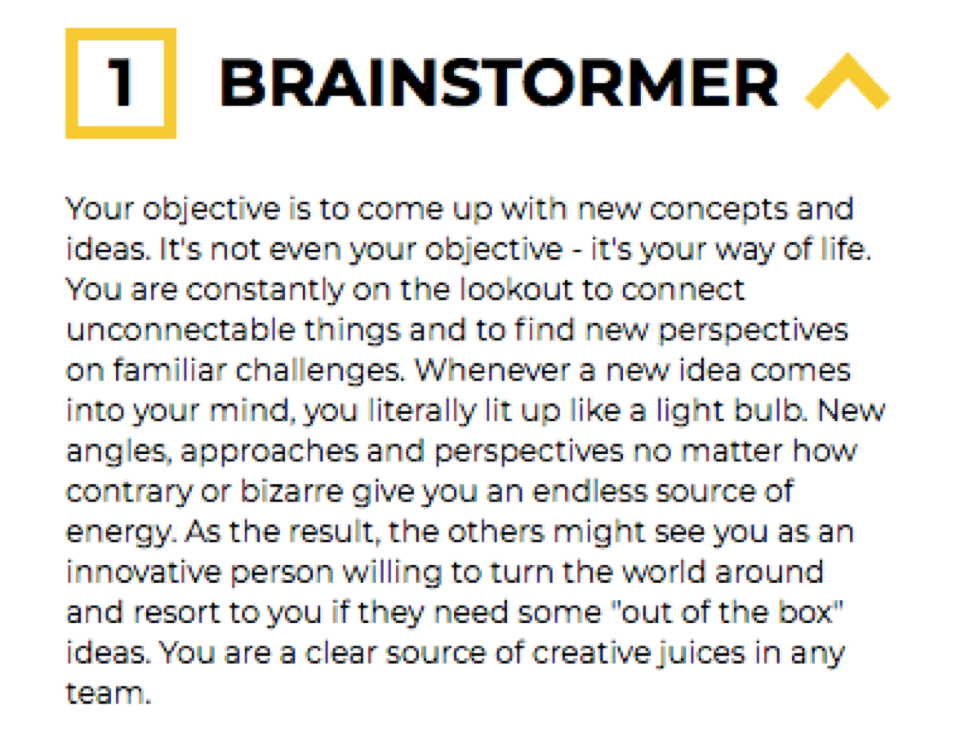
This one is spot on. Brainstorming isn’t what I do, it’s how I am. I need to be careful how I use this superpower. Like any gift, it can be remarkable or if used incorrectly, it can backfire. Because brainstorming isn’t a choice, it’s my nature, I need to be sensitive to the fact that someone telling me about a problem they have isn’t necessarily the same as them wanting or needing ideas on how to solve it. I’ve run into this before, when people are sharing stories, and I immediately suggest five different ways they can attack the problem, look at it from a different angle, and try to solve it. It is my instinctual and immediate reaction. The problem is that people have various reasons for sharing. Some just want to vent. Others seek to share their life with you as you have with them, without judgment or suggestion. It’s important to establish that someone is interested in your potential ideas and solutions before offering them. Asking can be awkward and uncomfortable (for you and others) in some situations, so it’s important to learn to “read the room” here. If you’re a Brainstormer and trying to get a sense whether a company is the right fit during an interview, you could ask, “What parts of this department could benefit from a different, more innovative approach?” or “What challenges is your company tackling that could use a fresh, reasoned and innovative approach?” There are companies you can work for that will LOVE this about you and consider this an amazing asset. In other businesses, however, this superpower could be a deterrent to your upward mobility as brainstormers are often questioning and therefore, disrupting the status quo. If you work in an industry where the leaders believe everything is just fine, offering suggestions for change maybe not be met with enthusiasm. Do your best to find industries and professions that crave your sense of constant improvement and big innovative ideas.
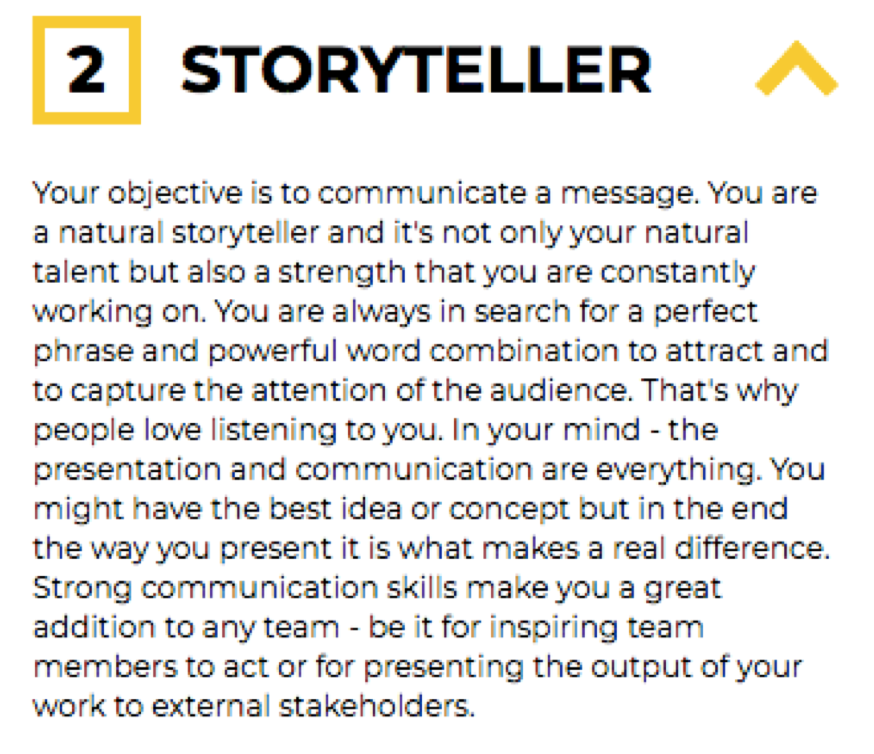
I love telling stories. I’m pretty outspoken, both at work and with my family and friends. Stories can educate and entertain, and I use my storytelling strength to do both. Making people laugh is something that brings me great joy. My father’s laugh is one of the greatest sounds I’ve ever heard, and I enjoy sharing stories just to hear him laugh. Storytelling is also a great tool to break the ice when meeting new people and networking. I’m sure I’ll be one of those old people chewing the ear off of the young (figuratively speaking, not Mike Tyson style) with my tales of the good old days.
A weakness of being a storyteller? Sometimes, when people ask you how your weekend was, they don’t really want to hear a story. Keeping things short and quick can be a challenge for storytellers. Ask if people want the “short version” before starting them down the twists and turns of your sagas.
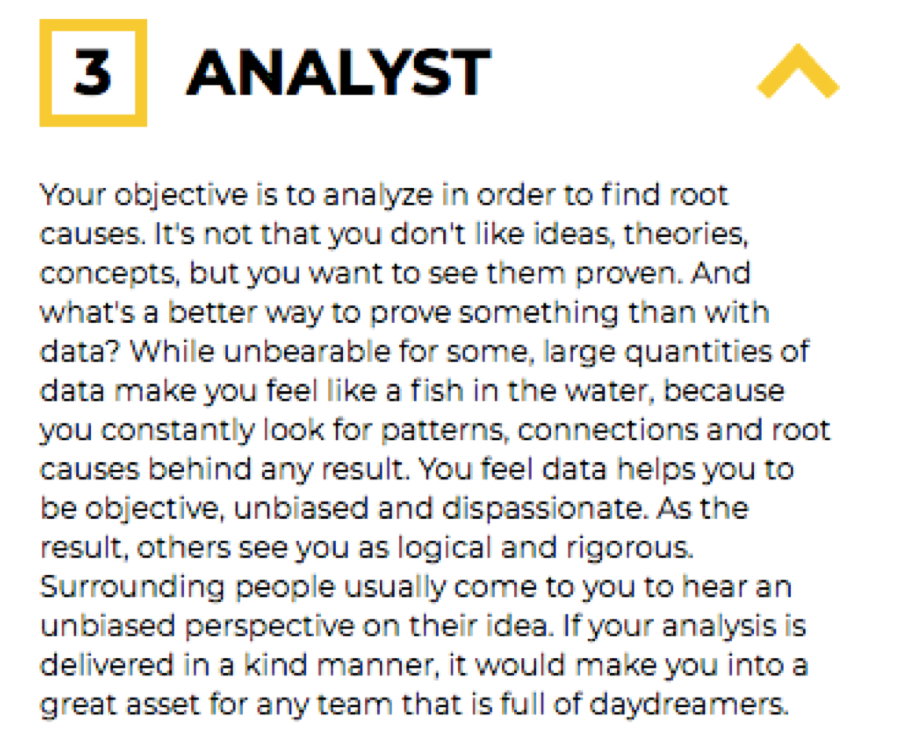
Charts and graphs anyone? If you love spreadsheets, charts, tables and graphs and invent reasons to make them, my friends, you are analysts. I use data analysis to prove things logically. Being a very passionate person (extroverted feelers holla), it’s easy to lose an audience of introverted thinkers. I speak passionately, but do my best to add logical arguments into my presentations to best reach all kinds of people. Data can be the greatest tool in trying to refute an argument, especially if your opponent doesn’t have data to back up their point of view.
My weakness as an analyst, and one you might share if it’s your strength, is overanalyzing. It’s often difficult for me to decide when enough research is enough, and I can use research as a reason or excuse to delay action, especially when I fear the results that taking action may bring. Analysts need to remember that research only serves the purpose of formulating a sound decision and taking the smartest course to serve your ultimate purpose. Data seldom points to a place without doubt or additional questions, so you need to decide when you have enough research to take the best course of action.
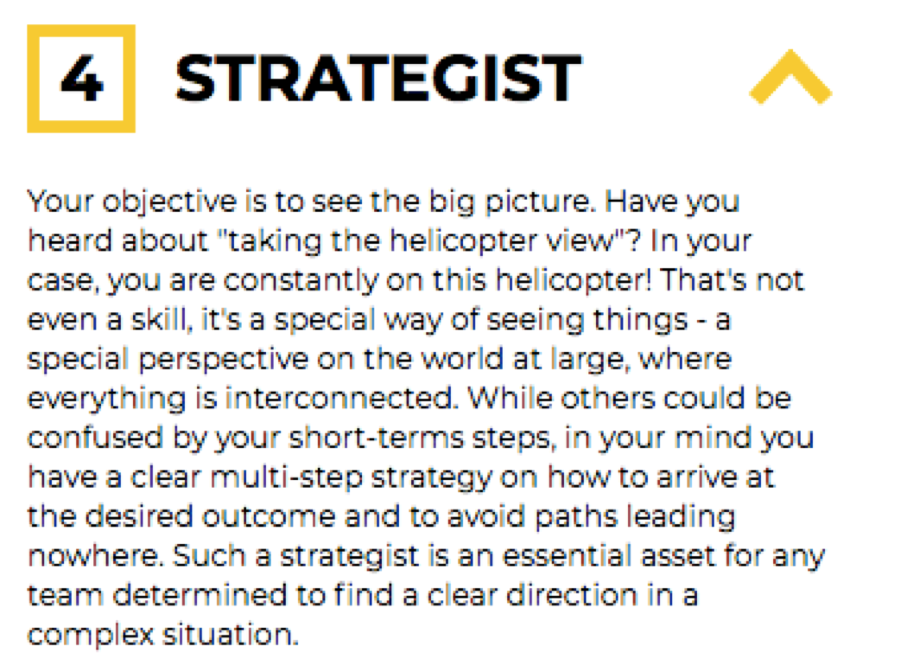
To me, being a strategist is very connected to my brainstorming strength. Seeing the big picture view is important for me when coming up with ideas and new ways of doing things. I often come up with enormous project ideas that require several multi-step strategies and actions to bring my concepts to life. This is where I can feel pressured by time and the size and scope of the projects I create.
My weaknesses as a strategist are mainly focused on the tiny action steps necessary to make my larger vision come to life. Coming up with big ideas and a multi-step strategy to execute them is easy, it’s the micro minutia that bogs me down and deflates my motivation. I don’t get stuck in the strategy; I get stuck in the tiny details as they absorb all my time. It takes me much longer to work through the weeds of the work and as a result, I lose the drive that had me super excited at the start of the project. I’ve learned coping mechanisms though. When creating a website, as an example, I wrote 45 pages of raw content in Word before ever placing anything on the actual website. Why? Because I knew that as soon as I started typing things on a webpage, I’d spend half a day picking out a font, three days to choose an overall website design layout, and entire evenings questioning every image. Even though I actually do enjoy working on them, those tiny details take me forever to execute and, in the past, have made me drop the current project for my next big idea where the same thing would probably ultimately happen. Outsourcing the micro can also be a great solution. You don’t have to do everything yourself. Setting up teams that are strong in your weak areas will heighten your chances of success and allow you to focus on your strength.
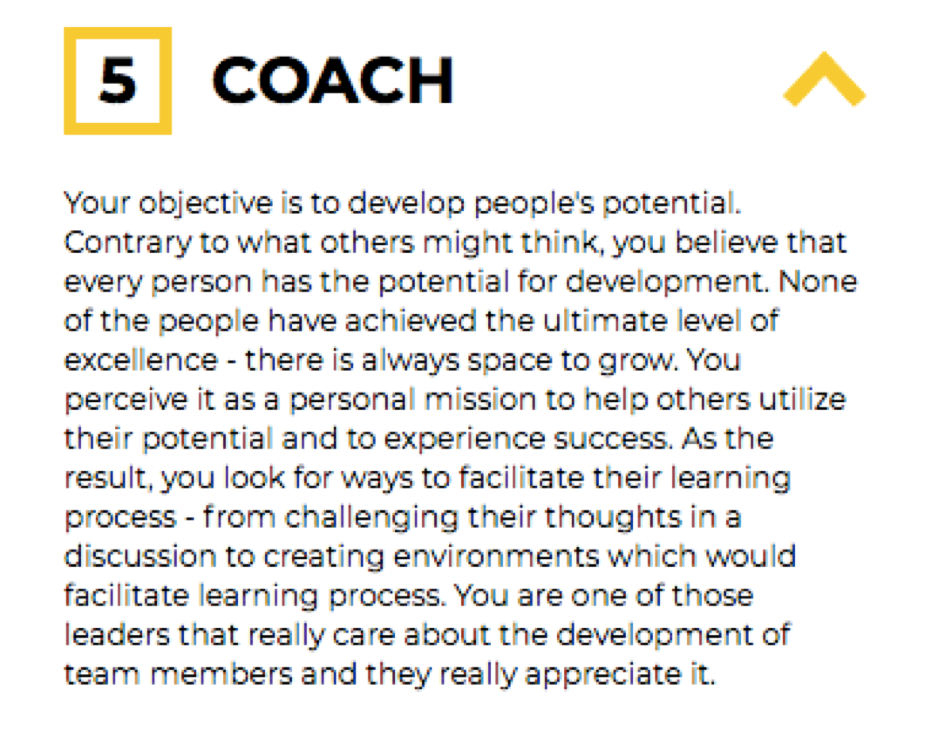
I believe that every person has the power within them to create the life they want. I personally strive for constant growth and improvement. Not only wanting to become my best self, I’m also energized when helping others become their best selves. I hope sharing my results, my strengths and the blocks that have kept me from maximizing those strengths in the past can show others that they’re not alone. Maybe you can relate to them. Maybe my insights can help you overcome your blocks. I still struggle with each of the weaknesses I’ve mentioned, but I’m much more successful managing them since I’ve named and discussed them. Remember, your strengths are natural, but correcting flaws requires consistent and conscious effort.
Not everyone will have the same strengths and weaknesses I have, but I hope exploring my world and sharing that here can open your eyes on how to do some deep learning about yourself. Find the tools that work best for you (some will be suggested within this website I’m sure) and be honest with yourself about who you really are. None of us are perfect, but fooling yourself isn’t helping you grow. I guess that’s the coach in me talking, challenging your thoughts, and creating environments to facilitate the learning process.
You can take the HIGH5 test and get your top 5 strengths listed for FREE.
They also offer an upgraded full report of your results, which includes:
-
All 20 of your strengths rank ordered (not just top 5),
-
Daily action items to enhance your specific strengths,
-
Your specific blind-spots,
-
A strengths compatibility profile tool to see how your strengths work together,
-
An analysis of what types of people will help best propel you forward.
This upgrade is usually $40, but you can unlock their full, premium reports for $29 through this affiliate link.
Back to Top
6 Human needs: what’s your driving force?
“About this test” Review by Melissa Bellemare:
Psychologist Chloe Madanes and author and life coach Tony Robbins placed all human psychological needs into six categories. We have all six of these needs but in different amounts. One or two of these needs are your driving force and can influence your action or lack of action and your choices. Your primary driving force can change over time. Those categories are the need for:
1. Certainty and Comfort: the needs for security, stability, predictability, and reliability.Have you ever watched a movie you have already seen? Do you order the same thing when you go to a restaurant you frequently visit? You know what to expect and that brings you comfort and peace.
2. Variety and Uncertainty: the needs for change, stimulation, challenge, and surprise. Do you enjoy new adventures? Things get boring when they are always the same. Mixing it up keeps things exciting.
3. Significance: the need to feel acknowledged, recognized, valued, and to feel pride.Do you want others to know about your accomplishments? Do you feel good after being told “good job”? Some people aren’t motivated by the accomplishment itself as much as they are by people recognizing and celebrating their achievements.
4. Love and Connection: the need to love and feel loved, to feel connection with others, togetherness, and unity. No one wants to go through life alone. Being part of a group can provide connection and support. Having someone to care for can give you purpose, having someone care for you can make you feel bullet proof.
5. Growth: the need to grow, improve, and develop in character, skills, knowledge, and spirit. Are you driven by achievement?Are you constantly seeking to learn new things and “be better” in all areas of life? The desire to become your best you can be very motivating.
6. Contribution: the need to give, help, and make a difference. Do you want to make your mark on the world and be remembered long after you are gone? Is it important to have your life matter to others and the world as a whole?
There can be strengths and weaknesses that arise as a result of how you would rank order the impact of these on your life. Also, a preference for one need may lead to a deficiency in another need. For instance, if certainty is one of your primary drivers, you may be risk averse, and if you can’t take risks, you cannot grow. If variety and uncertainty are primary drivers, you may self-sabotage relationships or other stable forces in your life that are fine because certainty is boring to you and uncertainty keeps you on your toes and makes you feel alive.
Madanes and Robbins’ analysis is a more detailed evaluation of psychologist Abraham Maslow’s hierarchy of needs. Maslow claimed that all humans had five levels of needs and that each need could be fulfilled only after the base needs were met. Maslow’s hierarchy of needs in order of importance are:
1. Physiological: food, water, shelter, sleep
2. Safety: security, law and order, stability (personal, emotional, financial and health)
3. Love and Belonging: friendships, intimacy, trust, acceptance, family
4. Esteem: respect, self-esteem, reputation, status
5. Self-actualization: desire to become the most and best that one can be, to reach one’s fullest potential
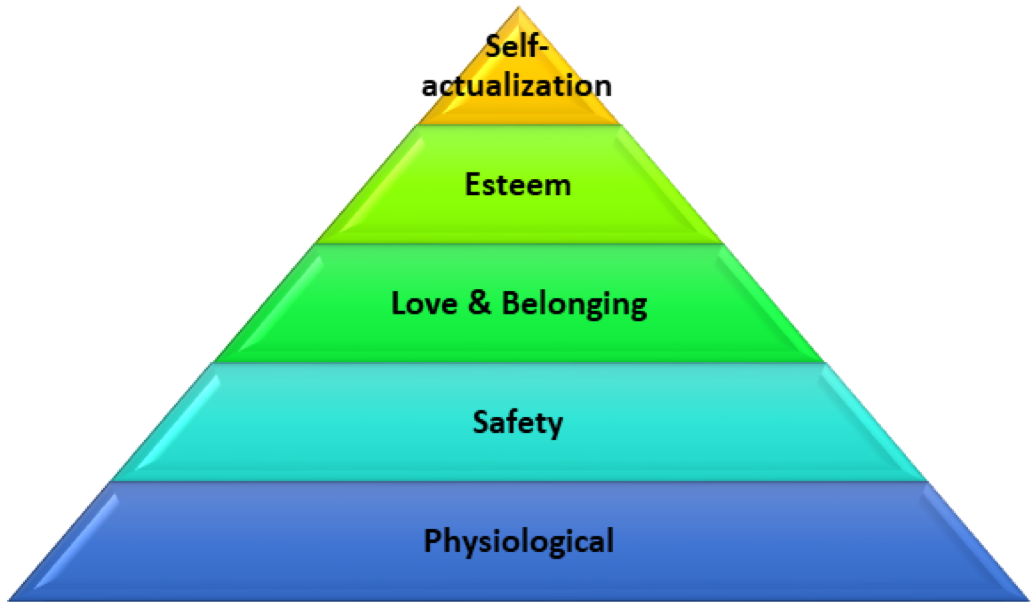
While these aren’t full descriptions of each need, they give you an idea what he meant and where he was going with his theory. What’s important to understand about these needs is that you cannot get to the next level until all levels below that need are satisfied. If base needs aren’t met, one cannot function optimally. You cannot build a solid house upon a weak or cracked foundation, so find ways to satisfy your first four needs before attempting to reach your goals. If you aren’t getting enough sleep, you’re in poor health, feel alone and don’t like yourself very much, achieving a Millionaire State isn’t very likely.
My results on the 6 Human Needs Test:
Top 3 Needs: Growth, Connection, and Certainty. These top three needs work together in explaining the things I love and how I act.
This test rank orders each human need in the order of importance to you. Understanding your lowest need is as important as understanding your greatest need in assessing behavioral patterns. My bottom need is Uncertainty and can be seen as a potential weakness. If uncertainty is my lowest need, it may mean that I also avoid it. You may unknowingly take actions to sabotage yourself to avoid feeling your bottom need. For me, this was an ah-ha moment. Now, I understood why I research the hell out of everything, but delay taking action, sometimes missing out on opportunities. Since certainty is much higher on my list of needs than uncertainty, I avoid unknowns and risk, even though I am being pushed by my growth need. It also explains why I feel badly and unaccomplished when I miss an opportunity. I want to grow, but uncertainty that could potentially negatively influence my security scares the crap out of me. “Pushing yourself” means acting in ways that are uncomfortable and may go against your gut instincts and normal courses of behavior. Knowing this helps me to kick myself in the butt and break old habits of behavior that had stifled my growth in the past.
At times, your highest needs can also cause a conflict because they can fight against each other. My primary drivers of growth and connection can serve as an example. Growing requires you to focus on yourself, while connection means focusing on other people. Focus too much on either need is neglecting the other, which can lead to feeling unfulfilled. A balanced focus and finding ways to combine these two opposing needs is the key to success for me. I like to accomplish this by including my friends and family in my growth process. I want to help them achieve their goals, and sharing my goals and more specifically, my process, successes, and road blocks with them keeps me focused and motivated. Growing together fulfills both of my primary drivers, so including others in my growth process is super important for me. It also helps fulfill my “contribution” need as well.
Reading The Six Human Needs on LifeCoachingInterventions after completing the test can help you figure out how your top needs may clash and how to best counteract that issue for achievement and happiness. While there are many other more detailed books on the topic, this a quick read, it’s FREE, and I highly recommend it.
Back to Top
4 tendencies: how do you respond to expectations?
“About this test” Review by Melissa Bellemare:
Gretchen Rubin, New York Times best selling author, asked one question that helps you figure out a lot about yourself and others: How do people respond to expectations? This question considers how you respond to both outer expectations (those placed on you by others) and inner expectations (those you place on yourself). While this might seem like a simple question, it’s important when you are trying to figure out two things:
1. Why you and others act or what stops you and others from acting
2. How to best persuade yourself and others to act and avoid conflict
This can be super important when managing people and also when trying to overcome inaction.
This test will tell you which of the four tendencies defines you. The four types are:
1. Upholders who respond well to both outer and inner expectations
2. Obligers who respond well to outer expectations but struggle to meet inner expectations
3. Questioners who question all expectations and only meet those they believe are justified
4. Rebels who resist all expectations
My results: I am absolutely a Questioner. Gretchen’s description had me pegged: Logic and sound reason, research, the question “why,” the disdain for arbitrary rules and ineffective processes, and suffering from “analysis paralysis;” these things absolutely define me and how I approach the world. This quiz and Gretchen’s book, The Four Tendencies, can really help give you clarity and strategies to operate within your tendency rather than to fight against it. It offers specific techniques tailored for your type that can be very useful in dealing with the challenges of being you. It’s also a great management tool when trying to motivate others towards action as well.
Interesting in learning more about the 4 Tendencies? Use the affiliate links below to check out Gretchen’s books on Amazon.
As Amazon Associates we earn from qualified purchases. This adds NO cost to you.
The Money Type: What is your relationship with money?
“About this test” Review by Melissa Bellemare:
The Money Type™ assessment: Your personality when it comes to savings, spending, investing, and money management.
This test breaks your money personality down into 5 possible types:
1. Producers – who closely monitor their spending and savings, evaluate and research buying and investing decisions, minimize risk, and value saving over spending.
2. Visionaries – non-conformists who believe money is a tool to follow their passion and serves as validation of their work. They are driven to do the work they love, and money doesn’t dictate their life choices.
3. Independents – who believe that the freedom to live life on their own terms is more important than accumulating money.
4. Epicures – who live in the now and love spending money on things and experiences that bring them joy.
5. Nurturers– who use money as a tool to help others. They are generous and want to be good providers.
This is the final test in our list, and it’s a winner. Not only does it discuss the characteristics of each type, it also goes over the pleasures, fears, and potential sabotage patterns of each type, helping you use pain and pleasure points as strong action motivators. It also tells you how strong your personality is in each area rather than telling you how much of each category you fit into. For example, you can be 90% like a Producer and 70% like a Visionary (so the numbers don’t add up to 100.)
My results: I’m ranked highest in the “Producer” category. My strength is planning for the future. I love saving and focus on the future, even if it means sacrificing happiness, comforts, and desired purchases in the present. Producers fear losing money or losing control of their money. As a result, my potential sabotage pattern as a “Producer” is compulsively savings and becoming overly conservative with money. I’m not taking the risks necessary to make larger sums of money because I’m not invested in highly volatile investments and end up with menial returns as a result of my conservativism.
The analysis of the fears and sabotage patterns of each type make this test well worth your time. It shines a mirror on you in such a way that motivates action and change. I highly recommend it.
Back to Top
